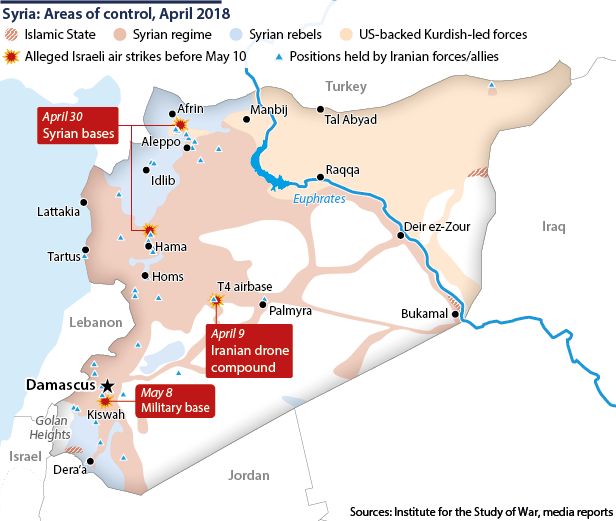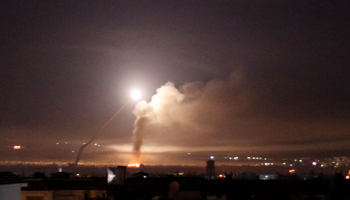Israel and Iran will play a zero-sum game in Syria
Burgeoning tensions and gradual escalation have culminated in a large-scale air assault
Israel today launched a broad barrage of attacks against Iranian facilities and equipment in Syria, killing at least 23 people. The Israeli military said it hit over 50 targets, including intelligence sites, logistics compounds, military posts and warehouses, as well as Syrian air defences that mobilised against Israeli jets. The attack followed pro-Iranian forces’ launch of around 20 rockets earlier in the day against the Israeli-occupied Golan Heights, which were intercepted and caused no damage.
What next
Israel will continue to strike any Iranian military sites in Syria, aiming to deter Tehran’s efforts to establish a long-term presence -- a longstanding Israeli ‘red line’. However, Iran has made a major investment in backing Damascus in the civil war, so establishing such a presence is a non-negotiable goal for Iran. To maintain credibility, Tehran will have to retaliate by any means available. It may take some time to regroup after the latest blow, but if in future it launches sufficient rockets that some get through Israel’s missile defence shield, causing significant casualties, the Israeli government would face massive public pressure to escalate further.
Subsidiary Impacts
- Lebanese Hezbollah will try to avoid being drawn in, at least while negotiating with Beirut partners to form a new coalition government.
- Israel will face separate security threats around May 14-15 in the Palestinian territories over the US Embassy move and Gaza protests.
- Israeli, French and Saudi pressure could persuade Washington to delay the planned withdrawal of US troops from Syria.
Analysis
Tensions between Iran and Israel have been rising on two fronts.
The first relates to the Iran nuclear deal, after Israeli Prime Minister Binyamin Netanyahu on April 30 presented a trove of Iranian nuclear documents, stolen by Mossad agents, claiming they proved Tehran is still misleading the international community about its nuclear plans. The subsequent US decision to withdraw from the 2015 Iran nuclear agreement has contributed to a context of rising regional confrontation (see MIDDLE EAST: Trump’s Iran choice will play into crises - May 8, 2018).
The second front is Syria, with Iran preparing for retaliation after several recent Israeli strikes against Iranian military targets rather than the more usual attacks on weapons-smuggling convoys of the Iranian-backed Lebanese Shia group, Hezbollah. Iran aims to expand its military presence and influence in Syria, threatening Israel; Israel is intent on preventing this from happening (see ISRAEL/IRAN: Aims will clash again in Syria - February 12, 2018).
With Israel on high alert for confrontation and expecting an imminent attack, Netanyahu yesterday visited Russian President Vladimir Putin. It appears he received at least tacit approval for today's crushing response, as Moscow did not activate its own, more powerful air defences in Syria. The Russian deputy foreign minister today called for "restraint" from all parties.
Israel's 'red lines'
Over the seven-year civil war in Syria, Israel has generally been successful at staying on the sidelines of the conflict. It clarified some 'red lines' that would evoke a military response: for example, any direct attack on Israeli territory, no matter who the perpetrator; or the smuggling of sophisticated weapons through Syria to Hezbollah in Lebanon.
100+
Israeli strikes on Syria since 2012
Reinforcing these red lines has resulted in over 100 Israeli strikes since early 2012. In most cases, Iran, Hezbollah and the government of Syrian President Bashar al-Assad have ignored these, choosing to concentrate on fighting their Sunni rivals inside Syria.
Iranian plans
However, the situation has changed significantly since mid-2017, with the pro-Assad camp ensuring its victory against the opposition and regaining control of more than two-thirds of the country. Iran, which provided 'boots on the ground' for Assad's victory (mainly by using Hezbollah and fighters from pro-Iranian Shia militias), now expects to receive some of the benefits.
Tehran has asked Assad to sign major financial deals and allow Iranian military forces and Shia militias to establish air, ground and naval bases across the country -- as a general projection of power, but also specifically to threaten Israel.
Israel fears that these discussions are part of a long-term Iranian plan for military entrenchment and domination in Syria. Since September 2017, Israel has therefore attacked Iranian assets in Syria at least seven times, including:
- a weapons factory in September;
- a Shia militia base in December;
- a group of Islamic Revolution Guard Corps (IRGC) commanders in February, after an Iranian drone was shot down in Israeli airspace;
- a similar group of commanders on April 9;
- a massive weapons shipment on April 29;
- a military outpost near Damascus on May 8; and
- today's comprehensive operation.
After seven Iranian advisers died in the April 9 strike, the IRGC repeatedly threatened Israel with severe retaliation. However, plans for today's Golan missile attack (attributed to Qassem Soleimani, commander of the 'Quds Force', the IRGC's external power projection arm) were uncovered by Israel, appearing in media reports on May 6. This gave the military ample time to plan its defence and response.
Military strategy
Unlike the past debate over Israel's strategy on the Iranian nuclear project (when most of the security chiefs openly opposed Netanyahu's plans for a unilateral strike), or even on the usefulness of the 2015 nuclear deal, there is no internal disagreement over the Iranian presence in Syria.
Israel fears a simultaneous assault from Syria and Lebanon
Chief of Staff Gadi Eisenkot encouraged the government to adopt its current hawkish approach, with repeated strikes aiming to deter Tehran. Eisenkot believes that Israeli restraint would potentially allow Iran to deploy missiles and forces as it did through Hezbollah in Lebanon after Israel's 2006 attack. Although UN Security Council Resolution 1701 has specifically forbidden weapons smuggling to Lebanon, Israel assumes the Shia organisation now holds an arsenal of more than 100,000 missiles and rockets, able to reach every target in Israel.
If Iran developed similar capacity in Syria, it could attack from a new direction at greater depth, forcing the Israeli air force to deal with both countries simultaneously (see ISRAEL/LEBANON/SYRIA: Border tensions will rise - April 4, 2017).
Israel is principally concerned with two major developments:
- Iranian shipments of modern anti-aircraft systems and ground-to-ground missiles to Syria; and
- the encampment of Shia militiamen near its border in the Golan Heights.
In November 2017, Israel failed to persuade the United States and Russia to force the militias to stay east of the Damascus-Deraa road, about 60 kilometres from the border (see ISRAEL: Diplomacy will fail to quash Iran-Syria threat - September 1, 2017). They are now all over Syria, some within 10-30 kilometres of Israeli territory.
Escalation scenario
Israel calculates that in case of a direct confrontation with Iranian forces in Syria, it would have an advantage as long as Lebanese Hezbollah stayed out of the conflict -- but this is a very uncertain assumption. If Iran pushed its (financially dependent) protege Hezbollah to full-scale mobilisation, that would create a major threat to Israeli population centres and could quickly escalate into a regional war.
Although Israel is chary of a wider conflict, any Iranian attack that got through and caused major casualties might force the government to order large-scale retaliation. In the long term, the irreconcilable interests of Iran and Israel in Syria make this a plausible scenario.
In the short term, however, the chances of escalation are lower, given the potential combatants' core interests. Israel fears massive destruction on the home front. Hezbollah is recovering from five years of war.
As for Iran, in the wake of the US nuclear deal decision, it may be more focused on devising a new strategy and arguably less ready for an immediate confrontation. Moreover, following this morning's strikes, its military position in Syria has been significantly weakened for now, likely forcing it to look at asymmetric and non-conventional retaliation options.

